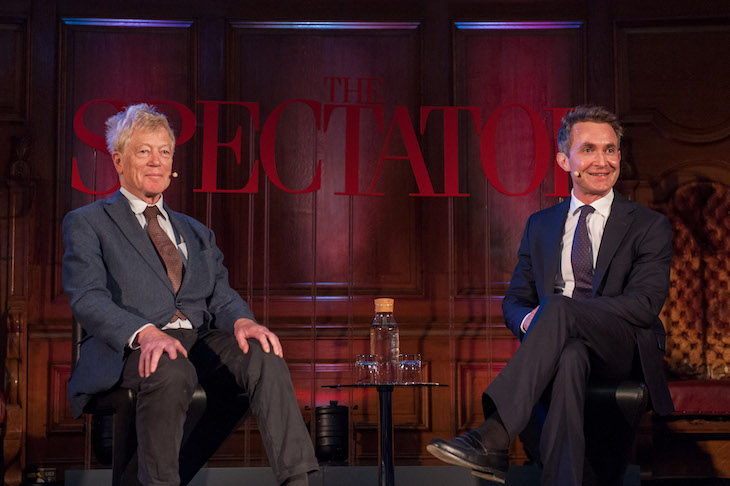What does it mean to be a Conservative? It’s a question that most of the Tory front bench might struggle to answer these days, but if they were looking for guidance, they could do worse than heading to a packed Emmanuel Centre in London this evening. There, author, journalist and Spectator Associate Editor Douglas Murray was joined by the philosopher and housing tsar Sir Roger Scruton, as they discussed the future of Conservatism.
The pair covered a large amount of ground over the course of the evening, as they mulled over the reasons the Conservative Party had abandoned its right-wing roots, the left’s advantage in communicating slogans, and the role of beauty, hope and love in modern Britain.
As you would expect, the conversation also turned to Sir Roger’s recent sacking from the government’s Building Better Building Beautiful Commission, following an interview he gave to the New Statesman. Last month, Murray exposed in The Spectator the ways Scruton’s interview had been taken out of context to justify his removal, and Scruton revealed fresh details of the episode this evening.
When asked by an audience member which of the Tory MPs who had initially called for him to be removed (Johnny Mercer, Tom Tugendhat and James Brokenshire, who fired Scruton) had apologised to the philosopher, he revealed that:
‘I have had a very nice letter from Tom Tugendhat… which was apologetic and I replied to it in the same friendly spirit… Obviously I’ve had no apology from Mr Mercer….
And my relationship with Brokenshire is complex to say the least. I can say there has been no apology. There’s been a letter explaining in some way… but I wrote back to that and said you know that’s not really an apology… so I wait for an apology but I don’t expect to get one. Because apologies are very costly, they require you to see yourself from the outside and pass judgement on yourself…’
Murray commented on the very political phrasing Brokenshire used when speaking about the affair, which was to say ‘he thought things could have been done better’, to which Scruton suggested ‘better’ might mean ‘well, if I’d been shot. It would have been much more effective.’
Scruton also suggested that the problem was that many of his detractors on social media ‘would not have the patience to read anything that I’d written, or the ability probably. But nonetheless social media provided them… these people who ought not to have a voice, with a voice.’ And it was unfortunate that politicians paid attention to them.
Murray added that was why we have people in politics like the ‘Conservative minister who dispensed of your services without bothering to read what you’d said.’
But in the end, the message was one of forgiveness, and Scruton reminded the audience that they ‘shouldn’t use this platform to denigrate people.’
Mr S can only admire his magnanimity…







Comments